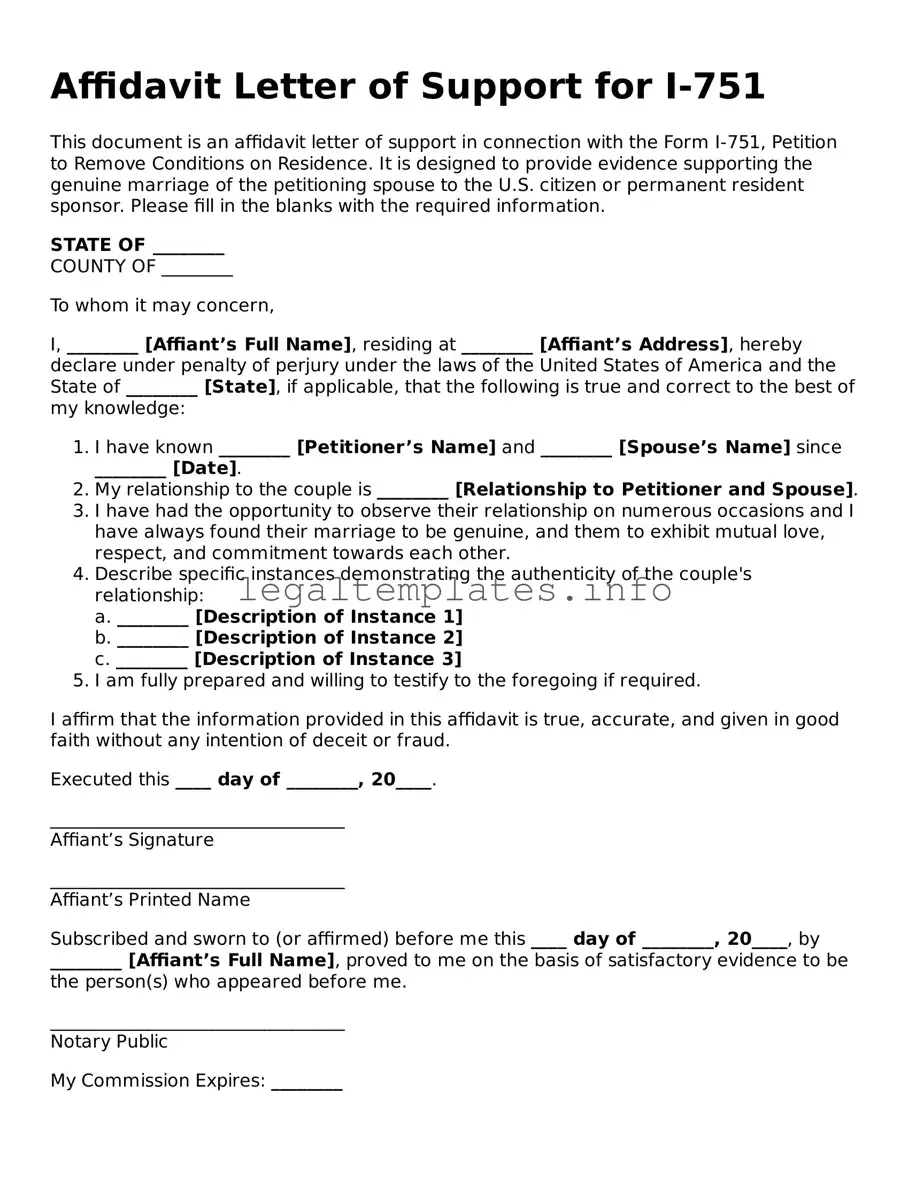The Affidavit of Support (Form I-864) is quite similar to the Affidavit Letter of Support for the I-751 form, primarily because both serve the purpose of establishing financial support or backing for someone seeking to reside permanently in the United States. In the case of Form I-864, it's used specifically during the process of obtaining a green card through marriage, ensuring the government that the immigrant will not become a public charge. This is paralleled in the I-751, where the affidavits serve as proof of a bona fide marriage, often submitted by friends or family as part of the petition to remove conditions on residency.
Another document with strong resemblance is the Letter of Support for a Visa Application. Similar to the I-751 affidavit, this letter can be provided by friends or family members but is tailored for various visa types, often describing the applicant's character and the legitimacy of their visit or stay. This document supports the visa application process, indicating the applicant's intentions are genuine, much like the I-751 affidavit supports the genuine nature of a marriage.
The Sponsorship Letter for Education bears a similarity to the Affidavit Letter of Support for I-751 as well. It demonstrates the sponsor's commitment to supporting the student financially during their studies. Though it pertains to education rather than immigration status, the core concept of attesting to someone's support remains the same, showcasing the sponsor's responsibility and the beneficiary’s reliability.
A Financial Affidavit is another document that shares commonalities with the I-751 affidavit, particularly in divorce cases. It details an individual's financial earnings and assets to determine alimony or child support, providing a court with evidence of financial status. Like the I-751 affidavit, it is a legal document used to present factual information crucial for legal determinations.
Character Reference Letters for Court resemble the Affidavit Letter of Support for I-751 in their purpose of portraying the character of the individual in question. While the latter focuses on the authenticity of a marital relationship, a character reference letter might be used to influence sentencing by offering a more comprehensive view of the defendant’s moral and ethical character.
The Employment Verification Letter, often required by financial institutions or immigration authorities, serves as proof of employment and income. It is somewhat analogous to the I-751 affidavit, where both kinds of documents authenticate critical aspects of an individual's circumstances relevant to the decision-making process of an authority.
Letters of Invitation for a Visitor Visa have elements in common with the I-751 affidavit in that both involve a sponsor or supporter expressing their relationship to the applicant and detailing the purpose and length of the stay. Although one facilitates the entry and temporary stay of a visitor and the other supports an adjustment of immigration status, both play vital roles in the visa process.
Personal Affidavits are essentially self-declared statements that can pertain to a wide range of situations, including financial, marital, or health conditions. Much like the Affidavit Letter of Support for I-751, these documents provide essential information to authorities, serving as evidence or support for various claims or applications.
Lastly, Bank Letters or Statements for Visa Applications share a purpose with the I-751 affidavit in demonstrating financial stability or backing, albeit in a different context. Where the bank letters show financial capability to travel, live, or study abroad, fulfilling visa requirements, the I-751 affidavits substantiate the claim of a genuine marital relationship, thus facilitating the immigrant's path to permanent residency.

